Module 1 Lost and found Unit 2 & Unit 3 知识点练习课件34张PPT
文档属性
| 名称 | Module 1 Lost and found Unit 2 & Unit 3 知识点练习课件34张PPT | 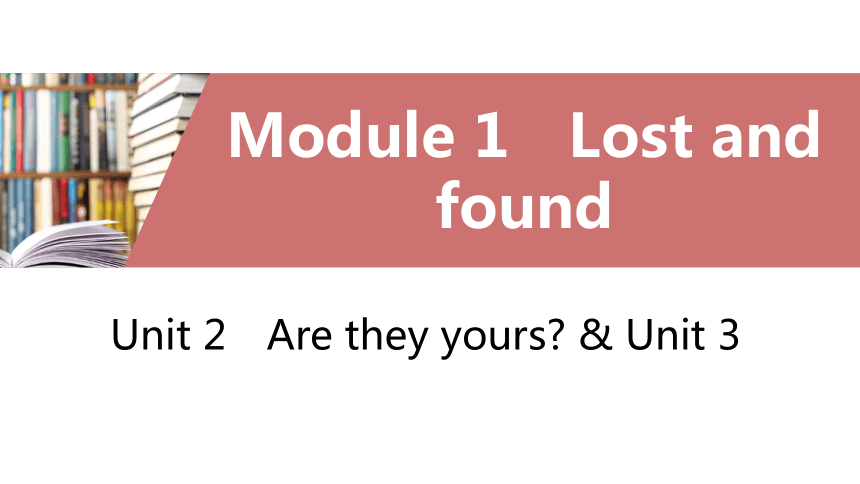 | |
| 格式 | zip | ||
| 文件大小 | 285.1KB | ||
| 资源类型 | 教案 | ||
| 版本资源 | 外研版 | ||
| 科目 | 英语 | ||
| 更新时间 | 2020-01-07 20:07:41 | ||
图片预览

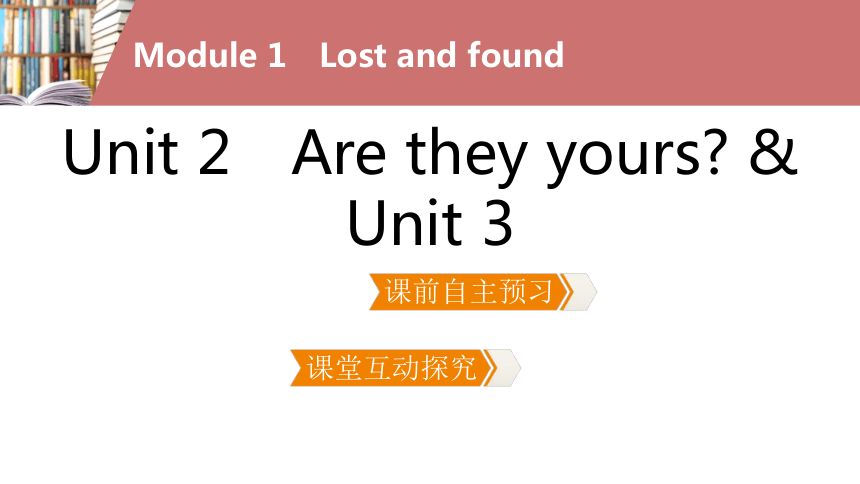
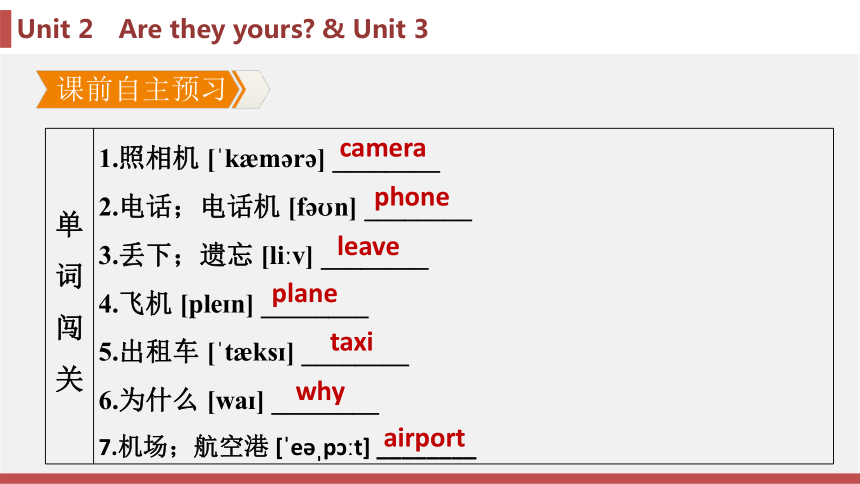
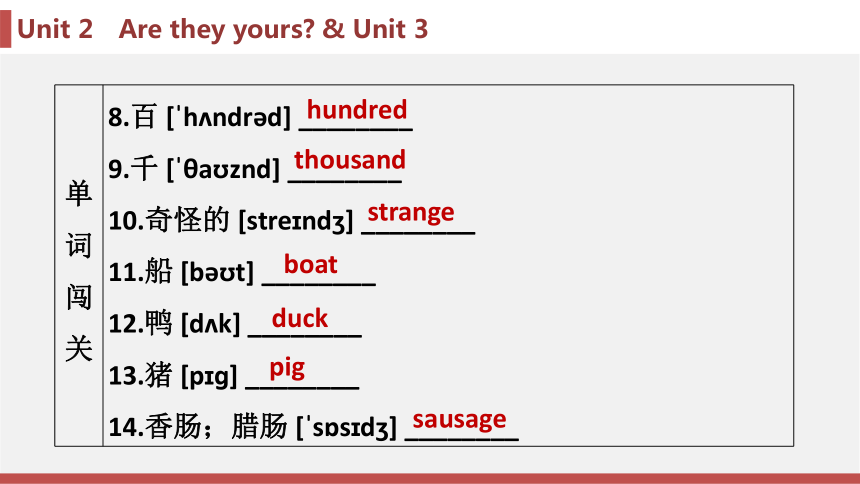
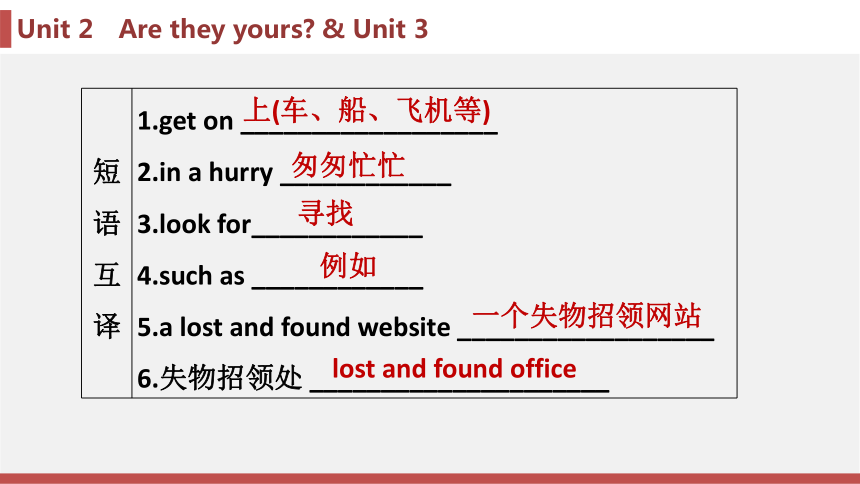

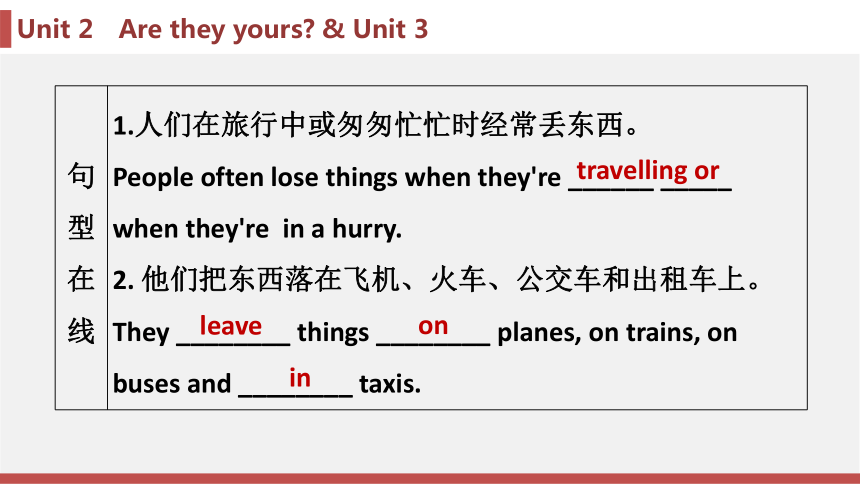
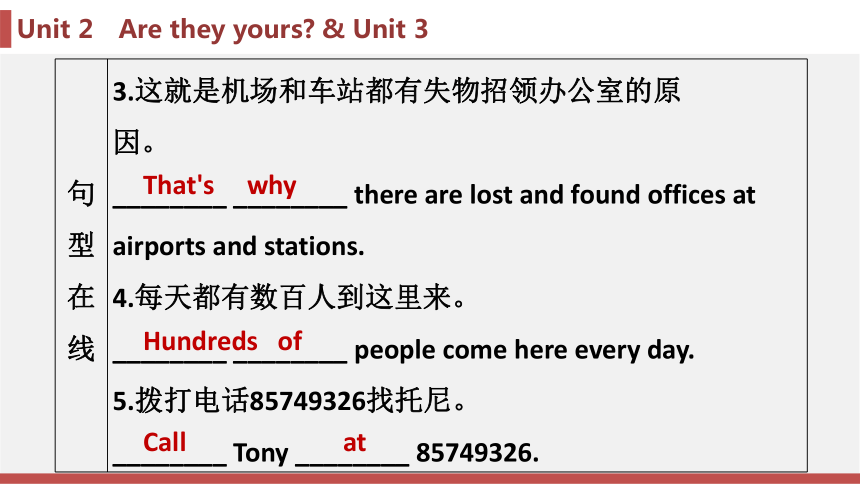
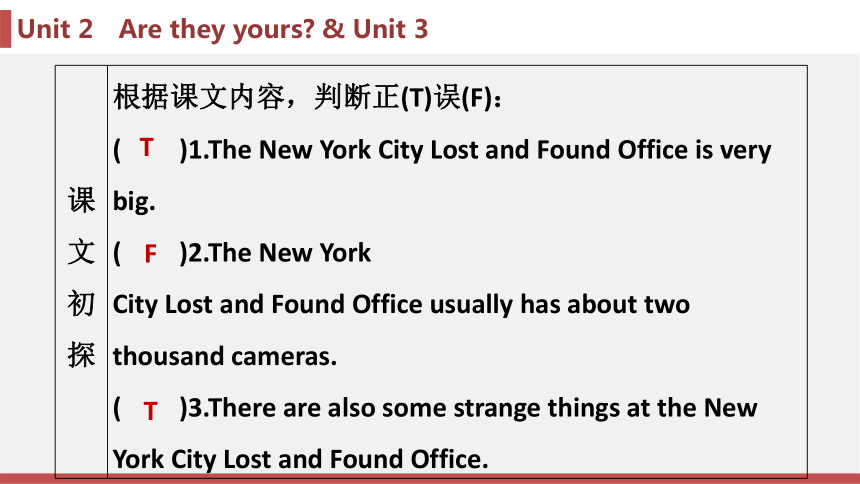

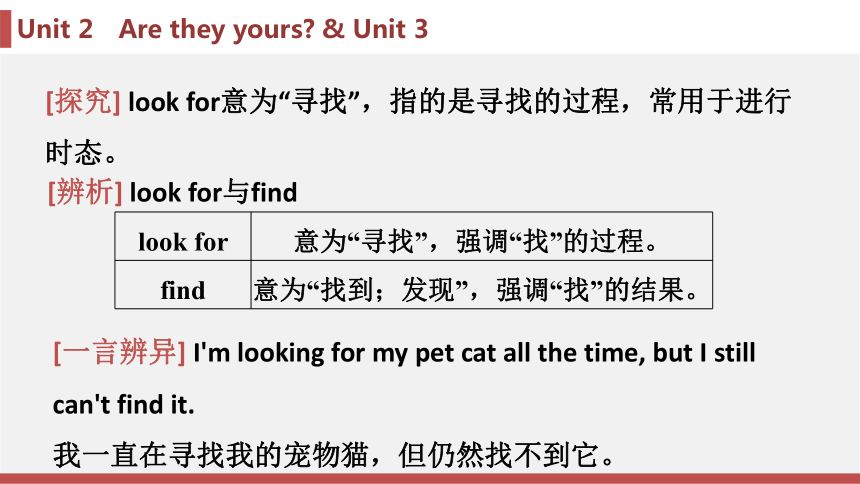
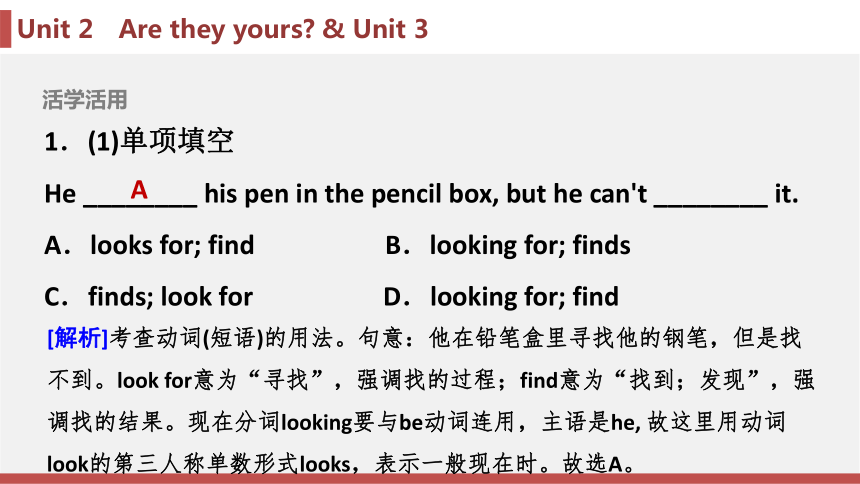
文档简介
课件34张PPT。Module 1 Lost and foundUnit 2 Are they yours? & Unit 3Module 1 Lost and foundUnit 2 Are they yours? & Unit 3课前自主预习 课堂互动探究 cameraphoneplanetaxileavewhyairportthousandstrangeboathundredduckpigsausage上(车、船、飞机等)匆匆忙忙寻找例如一个失物招领网站lost and found officemobile phonehundreds ofat the momentNew York Citytravelling orleaveoninThat's whyHundreds ofCallatTFT词汇点睛1 look for 寻找[观察] I have an eraser. 我有一块橡皮擦。[探究] He is looking for his camera.
他正在寻找他的照相机。
What are they looking for? 他们正在寻找什么?[探究] look for意为“寻找”,指的是寻找的过程,常用于进行时态。[辨析] look for与find[一言辨异] I'm looking for my pet cat all the time, but I still can't find it.
我一直在寻找我的宠物猫,但仍然找不到它。活学活用1.(1)单项填空
He ________ his pen in the pencil box, but he can't ________ it.
A.looks for; find B.looking for; finds
C.finds; look for D.looking for; findA[解析]考查动词(短语)的用法。句意:他在铅笔盒里寻找他的钢笔,但是找不到。look for意为“寻找”,强调找的过程;find意为“找到;发现”,强调找的结果。现在分词looking要与be动词连用,主语是he, 故这里用动词look的第三人称单数形式looks,表示一般现在时。故选A。(2)根据汉语意思完成句子
我爸爸正在到处寻找他的手套。
My father ________ ________ ________ his gloves every-where.Is looking for2 in a hurry 匆匆忙忙[观察] People often lose things when they're travelling or when they're in a hurry. 人们在旅行中或匆匆忙忙时经常丢东西。
You're always in a hurry. What's wrong? 你总是很匆忙,怎么了?[探究]在短语in a hurry中,hurry为________词。该短语在句中可用作状语或表语,其中的a不能省略。名[拓展] (1)no hurry 意为“不忙;不必着急;有足够的时间”。例如:
There's no hurry. Do it slowly and carefully.
不用着急,慢慢地、细心地做。
(2)hurry 还可用作动词。“hurry to+地点名词”或“hurry+地点副词”意为“匆忙去某地”;hurry to do sth.意为“匆忙去做某事”;hurry up 意为“快点儿,赶快”,用来催促别人。例如:
He always hurries to work in the morning.
他早上总是匆忙地去上班。
Hurry up! Lingling is waiting for us.
快点儿!玲玲正在等着我们。活学活用2.(1)你匆匆忙忙地要去哪里呢?
Where are you going ________ ________ ________?
(2)快点儿,否则我们将赶不上火车。
________ ________, or we'll miss the train.in a hurryHurry up3 leave v. 丢下;遗忘[观察] They leave things on planes, on trains, on buses and in taxis. 他们把东西落在飞机、火车、公交车和出租车上。
Be careful not to leave your bag in the classroom.
小心不要把你的包落在教室里。[探究] leave常用来指因粗心而把某物落在某处,其后往往有一个地点状语,常用于“leave sb./sth.+in/on/at+地点”结构,意为“把某人/某物落在、忘在某地”。[拓展] (1)leave表示“遗忘”时,其近义词为forget,但forget指大脑不能记起过去的人或事。例如:I often forget my homework and leave it at home. 我经常忘记我的作业,把它落在家里。
(2)leave 作动词时,还可译为“离开(某地)”。“leave for+地点”意为“动身去某地”;“leave+A地点+for+B地点”意为“离开A地去B地”。例如: We leave school at five o'clock in the afternoon. 我们下午五点离开学校。They are leaving for Beijing tomorrow. 明天他们将动身去北京。
We are leaving Shanghai for London next week.
下周我们就要离开上海前往伦敦了。
(3)leave 还可用作名词,意为“假期;休假”。例如:
I'm too tired these days. I want to ask for three days' leave.
这些天我太累了,我想请三天假。活学活用3.2018·武威 —I can't find my English textbook.
—Is it possible (有可能的) that you ________ it at home?
A.lost B.saw
C.left D.gaveC4 hundred num. 百[观察] Hundreds of people come here every day.
每天都有数百人来这里。
There are nine hundred students in our school.
我们学校有九百名学生。[探究] hundred作数词,意为“百”,表示概数时,hundred用________数形式,且与________连用,意为“几百;成百上千”;表示确数时,hundred用________数形式,前面有具体的数字。复of单[拓展]类似用法的数词还有thousand(千), million(百万)与billion(十亿)。活学活用4.2018·曲靖 In our home town, ________ villagers leave for big cities to look for jobs.
A.two hundreds of
B.hundred of
C.hundreds of
D.two hundredsC5 such as 比如[观察] There are many lost and found websites, such as www.lostand-found.com and www.foundbin.com. 有许多失物招领网站,比如www.lostandfound.com 和www.foundbin.com。[探究]短语such as一般用于列举同一类人或事物中的几个例子,但必须少于前面所提及的总数,只能在所列举的人或事物之前,其后不用标点。例如:
I like fruit, such as apples and bananas.
我喜欢水果,比如苹果和香蕉。[拓展] for example 意为“比如”,一般用于列举同一类人或事物中的一个例子,位置较灵活,可位于句首、句中或句末。活学活用5.用such as或for example填空
(1)I have some good friends,________ Tom and Daming.
(2)____________, my favourite book is Hamlet.such asFor example句型透视1 That's why there are lost and found offices at airports and stations.
这就是机场和车站都有失物招领办公室的原因。[探究] “That's why…”表示“这就是……的原因”,常用于句首,后面跟表示结果的句子。例如:
Tom got up late this morning. That is why he was late for work.
汤姆今天早晨起晚了。这就是他上班迟到的原因。1.—Do you like swimming?
—Yes, I do. It can make me strong. That's ________ I enjoy it so much.
A.what B.who
C.where D.why活学活用D2 Call Tony at 85749326. 拨打电话85749326找托尼。[探究] call sb. at/on…意为“拨打……(号码)找某人”。例如:
You can call me at/on 55672325.
你可以拨打55672325找我。2. Please call Mr Yang ________ 58818088 for help if you have any problems.
A.under B.at
C.as D.inB活学活用The Lost and Found Office in New York Citytravelling课文回顾People often things when they’re 1. ________ or when they’re 2. _________. People come here to look for phones,cameras,
3. ________ ,computers and many other things.There are also strange things:bikes,a large boat,
4. ________ and sausages.in a hurrywatchesanimals
谢 谢 观 看!
他正在寻找他的照相机。
What are they looking for? 他们正在寻找什么?[探究] look for意为“寻找”,指的是寻找的过程,常用于进行时态。[辨析] look for与find[一言辨异] I'm looking for my pet cat all the time, but I still can't find it.
我一直在寻找我的宠物猫,但仍然找不到它。活学活用1.(1)单项填空
He ________ his pen in the pencil box, but he can't ________ it.
A.looks for; find B.looking for; finds
C.finds; look for D.looking for; findA[解析]考查动词(短语)的用法。句意:他在铅笔盒里寻找他的钢笔,但是找不到。look for意为“寻找”,强调找的过程;find意为“找到;发现”,强调找的结果。现在分词looking要与be动词连用,主语是he, 故这里用动词look的第三人称单数形式looks,表示一般现在时。故选A。(2)根据汉语意思完成句子
我爸爸正在到处寻找他的手套。
My father ________ ________ ________ his gloves every-where.Is looking for2 in a hurry 匆匆忙忙[观察] People often lose things when they're travelling or when they're in a hurry. 人们在旅行中或匆匆忙忙时经常丢东西。
You're always in a hurry. What's wrong? 你总是很匆忙,怎么了?[探究]在短语in a hurry中,hurry为________词。该短语在句中可用作状语或表语,其中的a不能省略。名[拓展] (1)no hurry 意为“不忙;不必着急;有足够的时间”。例如:
There's no hurry. Do it slowly and carefully.
不用着急,慢慢地、细心地做。
(2)hurry 还可用作动词。“hurry to+地点名词”或“hurry+地点副词”意为“匆忙去某地”;hurry to do sth.意为“匆忙去做某事”;hurry up 意为“快点儿,赶快”,用来催促别人。例如:
He always hurries to work in the morning.
他早上总是匆忙地去上班。
Hurry up! Lingling is waiting for us.
快点儿!玲玲正在等着我们。活学活用2.(1)你匆匆忙忙地要去哪里呢?
Where are you going ________ ________ ________?
(2)快点儿,否则我们将赶不上火车。
________ ________, or we'll miss the train.in a hurryHurry up3 leave v. 丢下;遗忘[观察] They leave things on planes, on trains, on buses and in taxis. 他们把东西落在飞机、火车、公交车和出租车上。
Be careful not to leave your bag in the classroom.
小心不要把你的包落在教室里。[探究] leave常用来指因粗心而把某物落在某处,其后往往有一个地点状语,常用于“leave sb./sth.+in/on/at+地点”结构,意为“把某人/某物落在、忘在某地”。[拓展] (1)leave表示“遗忘”时,其近义词为forget,但forget指大脑不能记起过去的人或事。例如:I often forget my homework and leave it at home. 我经常忘记我的作业,把它落在家里。
(2)leave 作动词时,还可译为“离开(某地)”。“leave for+地点”意为“动身去某地”;“leave+A地点+for+B地点”意为“离开A地去B地”。例如: We leave school at five o'clock in the afternoon. 我们下午五点离开学校。They are leaving for Beijing tomorrow. 明天他们将动身去北京。
We are leaving Shanghai for London next week.
下周我们就要离开上海前往伦敦了。
(3)leave 还可用作名词,意为“假期;休假”。例如:
I'm too tired these days. I want to ask for three days' leave.
这些天我太累了,我想请三天假。活学活用3.2018·武威 —I can't find my English textbook.
—Is it possible (有可能的) that you ________ it at home?
A.lost B.saw
C.left D.gaveC4 hundred num. 百[观察] Hundreds of people come here every day.
每天都有数百人来这里。
There are nine hundred students in our school.
我们学校有九百名学生。[探究] hundred作数词,意为“百”,表示概数时,hundred用________数形式,且与________连用,意为“几百;成百上千”;表示确数时,hundred用________数形式,前面有具体的数字。复of单[拓展]类似用法的数词还有thousand(千), million(百万)与billion(十亿)。活学活用4.2018·曲靖 In our home town, ________ villagers leave for big cities to look for jobs.
A.two hundreds of
B.hundred of
C.hundreds of
D.two hundredsC5 such as 比如[观察] There are many lost and found websites, such as www.lostand-found.com and www.foundbin.com. 有许多失物招领网站,比如www.lostandfound.com 和www.foundbin.com。[探究]短语such as一般用于列举同一类人或事物中的几个例子,但必须少于前面所提及的总数,只能在所列举的人或事物之前,其后不用标点。例如:
I like fruit, such as apples and bananas.
我喜欢水果,比如苹果和香蕉。[拓展] for example 意为“比如”,一般用于列举同一类人或事物中的一个例子,位置较灵活,可位于句首、句中或句末。活学活用5.用such as或for example填空
(1)I have some good friends,________ Tom and Daming.
(2)____________, my favourite book is Hamlet.such asFor example句型透视1 That's why there are lost and found offices at airports and stations.
这就是机场和车站都有失物招领办公室的原因。[探究] “That's why…”表示“这就是……的原因”,常用于句首,后面跟表示结果的句子。例如:
Tom got up late this morning. That is why he was late for work.
汤姆今天早晨起晚了。这就是他上班迟到的原因。1.—Do you like swimming?
—Yes, I do. It can make me strong. That's ________ I enjoy it so much.
A.what B.who
C.where D.why活学活用D2 Call Tony at 85749326. 拨打电话85749326找托尼。[探究] call sb. at/on…意为“拨打……(号码)找某人”。例如:
You can call me at/on 55672325.
你可以拨打55672325找我。2. Please call Mr Yang ________ 58818088 for help if you have any problems.
A.under B.at
C.as D.inB活学活用The Lost and Found Office in New York Citytravelling课文回顾People often things when they’re 1. ________ or when they’re 2. _________. People come here to look for phones,cameras,
3. ________ ,computers and many other things.There are also strange things:bikes,a large boat,
4. ________ and sausages.in a hurrywatchesanimals
谢 谢 观 看!
同课章节目录
- Module 1 Lost and found
- Unit 1 Whose bag is this?
- Unit 2 Are they yours?
- Unit 3 Language in use
- Module 2 What can you do ?
- Unit 1 I can play the piano
- Unit 2 I can run really fast
- Unit 3 Language in use
- Module 3 Making plans
- Unit 1 What are you going to do at the weekends?
- Unit 2 We're going to cheer the players.
- Unit 3 Language in use
- Module 4 Life in the future
- Unit 1 Everyone will study at home
- Unit 2 Every family will have a small plane.
- Unit 3 Language in use
- Module 5 Shopping
- Unit 1 What can I do for you?
- Unit 2 You can buy everything on the Internet
- Unit 3 Language in use
- Module 6 Around town
- Unit 1 Could you tell me how to get to the Nationa
- Unit 2 The London Eye is on your right.
- Unit 3 Language in use
- Revision module A
- Module 7 My past life
- Unit 1 I was born in a small village.
- Unit 2 I was born in Quincy.
- Unit 3 Language in use
- Module 8 Story time
- Unit 1 Once upon a time….
- Unit 2 Goldilocks hurried out of the house.
- Unit 3 Language in use
- Module 9 Life history
- Unit 1 He left school and began work at the age of
- Unit 2 He decided to be an actor.
- Unit 3 Language in use
- Module 10 A holiday journey
- Unit 1 What did you do?
- Unit 2 This morning we took a walk.
- Unit 3 Language in use
- Module 11 Body language
- Unit 1 They touch noses!
- Unit 2 Here are some ways to welcome them.
- Unit 3 Language in use
- Module 12 Western music
- Unit 1 It's so beautiful!
- Unit 2 Vienna is the centre of European classical
- Unit 3 Language in use
- Revision module B
